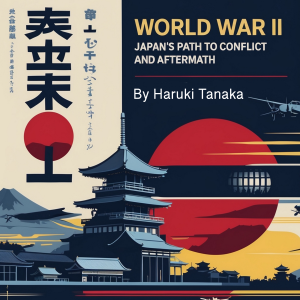

World War II
Haruki Tanaka
This audiobook is narrated by a digital voice.
Japan's journey into World War II began not with Pearl Harbor, but decades earlier through a complex web of imperial ambitions, economic pressures, and militaristic ideology that transformed a once-isolated island nation into an aggressive expansionist power. Understanding Japan's role in the Second World War requires examining the political, social, and economic forces that drove the country toward inevitable conflict with the Western powers.
The roots of Japan's wartime aggression can be traced to the Meiji Restoration of 1868, which marked the end of Japan's feudal system and the beginning of its rapid modernization. The new imperial government adopted the slogan "fukoku kyōhei" (rich country, strong military), recognizing that military strength was essential for national survival in an age of Western imperialism. This philosophy would profoundly shape Japanese thinking for the next century, creating a culture where military expansion was seen as both necessary and noble.
By the early twentieth century, Japan had already demonstrated its military prowess through victories in the First Sino-Japanese War (1894-1895) and the Russo-Japanese War (1904-1905). These conflicts established Japan as a regional power and provided valuable lessons in modern warfare. More importantly, they reinforced the belief among Japanese leaders that military action could solve the nation's fundamental problems, particularly its lack of natural resources and limited territory for its growing population.
Duration - 35m.
Author - Haruki Tanaka.
Narrator - Digital Voice Archie G.
Published Date - Sunday, 26 January 2025.
Copyright - © 2025 Haruki Tanaka ©.
Location:
United States
Description:
This audiobook is narrated by a digital voice. Japan's journey into World War II began not with Pearl Harbor, but decades earlier through a complex web of imperial ambitions, economic pressures, and militaristic ideology that transformed a once-isolated island nation into an aggressive expansionist power. Understanding Japan's role in the Second World War requires examining the political, social, and economic forces that drove the country toward inevitable conflict with the Western powers. The roots of Japan's wartime aggression can be traced to the Meiji Restoration of 1868, which marked the end of Japan's feudal system and the beginning of its rapid modernization. The new imperial government adopted the slogan "fukoku kyōhei" (rich country, strong military), recognizing that military strength was essential for national survival in an age of Western imperialism. This philosophy would profoundly shape Japanese thinking for the next century, creating a culture where military expansion was seen as both necessary and noble. By the early twentieth century, Japan had already demonstrated its military prowess through victories in the First Sino-Japanese War (1894-1895) and the Russo-Japanese War (1904-1905). These conflicts established Japan as a regional power and provided valuable lessons in modern warfare. More importantly, they reinforced the belief among Japanese leaders that military action could solve the nation's fundamental problems, particularly its lack of natural resources and limited territory for its growing population. Duration - 35m. Author - Haruki Tanaka. Narrator - Digital Voice Archie G. Published Date - Sunday, 26 January 2025. Copyright - © 2025 Haruki Tanaka ©.
Language:
English
Chapter 2: Early Victories and Imperial Expansion
Duration:00:08:17
Chapter 3: The Tide Turns - Midway to Guadalcanal
Duration:00:08:40
Chapter 4: The Home Front and Total War
Duration:00:08:59
Chapter 5: The Final Descent - From Saipan to Surrender
Duration:00:09:46